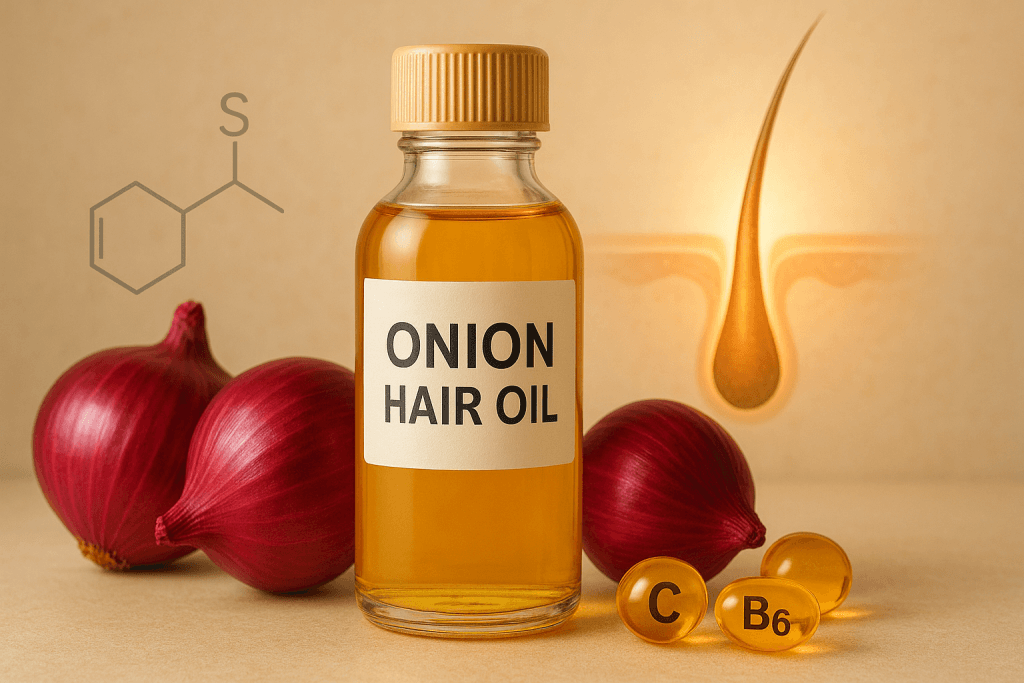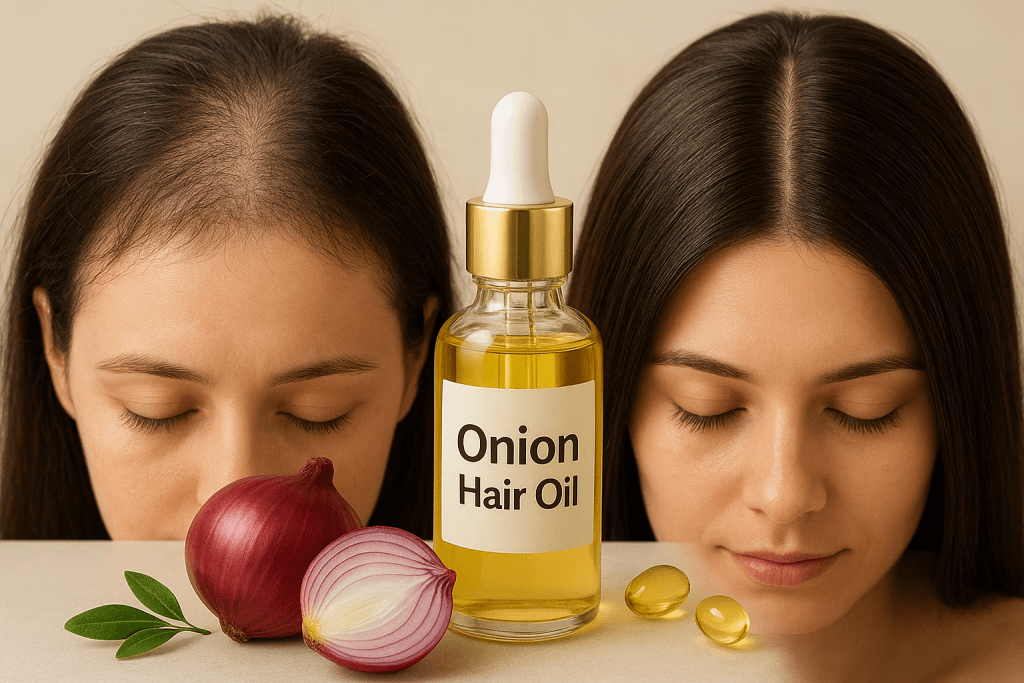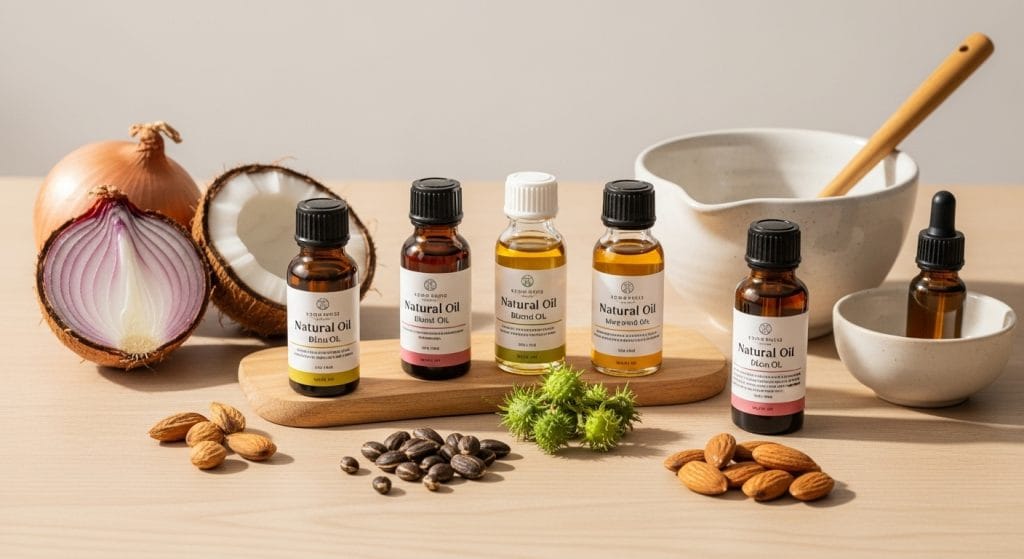Onion oil for hair growth gives hope to anyone struggling with hair loss, thinning, or slow regrowth. If you’ve tried endless products and remedies but still search for a solution that actually delivers, this guide will reveal how onion oil and similar natural solutions can truly transform your hair from the roots up. Learn practical tips, proven science, and actionable steps—plus the best ways to link related resources like Onion Hair Oil for Hair Loss and Fast Hair Growth Oil That Comes From Nature for deeper exploration.
Unlocking the Power of Onion Oil for Hair Growth

Centuries of anecdotal success and recent research highlight why onion oil continues to gain global attention. Many people seek a genuine fix for hair thinning, breakage, or stunted growth, but few know the complete science—or how to maximize benefits at home. If you’ve ever wondered how a kitchen staple could spark new confidence in your appearance, discover the truth about onion oil and its multitasking benefits.
Modern Studies
Modern studies and dermatological reviews increasingly support the traditional claims surrounding onion oil’s effectiveness for hair regrowth and scalp health. Research published in the Journal of Dermatology found that topical onion juice significantly improved hair regrowth in patients with alopecia areata after consistent use for six weeks, while follow-up studies suggest its high sulfur content enhances keratin production and improves blood circulation to hair follicles. Experts note that its natural antifungal and antibacterial properties also help maintain a cleaner, healthier scalp environment, reducing conditions that contribute to hair loss. These findings, supported by ongoing trials and clinical observations, explain why onion oil remains a promising, evidence-backed option in holistic hair care.
What makes onion oil so powerful for hair growth?

One critical reason onion oil stands out is its rich sulfur content, a vital element in building healthy, strong hair. Sulfur helps synthesize keratin, the protein foundation for every strand. Antioxidants, vitamins like C and B6, and minerals double down on scalp nourishment, not only protecting follicles from damage but also stimulating new growth. Natural antibacterial and anti-inflammatory properties keep the scalp balanced and free from issues that sabotage results. For a full breakdown of onion oil’s unique capabilities—and firsthand results—visit detailed guide on the relationship of hair growth and role of onion hair oil.
Does onion oil work for everyone seeking faster hair regrowth?

Results vary, but an increasing number of clinical studies (and real-world testimonials) point to significant improvements for those who use onion oil consistently and properly. While some may see new strands and greater thickness within weeks, others benefit from stronger, shinier, less breakage-prone hair over months. Consistency matters, and pairing onion oil with nourishing routines—as explained in onion-hair-oil-for-hair-growth—makes a difference.
Patience & Consistency
Outcomes from using onion oil can differ for each individual, but growing evidence from both scientific research and personal experiences highlights its remarkable potential for improving hair health. Many users report noticeable regrowth, increased volume, and improved texture when the oil is applied regularly and massaged into the scalp to stimulate follicles. Others experience gradual but lasting benefits such as reduced breakage, improved shine, and stronger strands over time. The key lies in patience, consistency, and combining onion oil with supportive hair care practices, as detailed in onion-hair-oil-for-hair-growth, to achieve the best long-term results.
Step By Step Guide Transforming Your Hair with Onion Oil
Mastering application methods and pairing onion oil with synergistic ingredients significantly boosts outcomes. Here’s how you can harness its power in your daily care:
- Start with clean, slightly damp hair to help oil penetrate.
- Warm a small amount of oil (not hot) for easier distribution and better scalp penetration.
- Section your hair to reach every area of your scalp.
- Apply onion oil, massaging deeply to enhance circulation.
- Leave in for at least 30 minutes, or overnight for an intensive treatment.
- Rinse thoroughly with gentle shampoo; repeat 2–3 times per week.
Can blending onion oil with other oils or masks improve results?

Absolutely. Combining onion oil with coconut, castor, or almond oil creates a powerful synergy that amplifies growth, shine, and manageability. For those looking to accelerate growth even more effectively, blending DIY masks with soothing ingredients lowers the chances of irritation and enhances results.
Real Stories How Onion Oil Changed Hair Growth Journeys
Hearing from others who faced similar struggles brings valuable insight. Many users observe less shedding, noticeable regrowth along hairlines, and softer, smoother strands within just a few weeks. Sometimes the solution appears gradual, but steady progress boosts confidence and helps build a routine you’ll actually stick with.
Nadeem’s Journey
Nadeem’s hair journey began with frustration and dwindling confidence as he noticed increasing hair thinning in his late twenties. After trying various expensive serums and salon treatments with little success, he turned to a simple, natural remedy—onion oil. Applying it three times a week and massaging it gently into his scalp, Nadeem began to notice subtle changes within a month: reduced shedding, fewer strands on his pillow, and a healthier shine returning to his hair. By the third month, new baby hairs had started to appear along his hairline, restoring not only his growth but also his self-assurance. Today, Nadeem swears by the consistency and simplicity of his routine, crediting onion oil as the turning point in his hair recovery journey.
What real results should users expect from regular onion oil use?
In most cases, short-term improvements include shinier, stronger, less brittle hair. With ongoing use, users often report fuller volume, reduced thinning, and the appearance of new growth—especially in trouble spots. Keep expectations realistic but optimistic; combining onion oil with a full-spectrum care plan delivers the most dramatic results.
Users who apply onion oil regularly can expect noticeable improvements in hair strength, thickness, and overall scalp health—especially when combined with gentle massage and a balanced hair care routine. With consistent use, most people begin to see reduced hair fall within a few weeks, followed by visible regrowth and stronger, shinier strands over the next few months. Onion oil works by stimulating blood circulation to the roots, nourishing follicles with sulfur and antioxidants, and preventing breakage caused by dryness or damage. Whether you’re in Pakistan, India, the UAE, or anywhere looking for a natural remedy for hair loss, onion oil remains one of the most affordable and effective solutions for boosting hair growth and restoring confidence naturally.
Comparing Onion Oil to Other Natural Growth Oils

While onion oil shines for targeted regrowth and thickness, other oils like rosemary, peppermint, and black seed boast overlapping benefits. Each has unique compounds, but they all promote circulation, support follicle health, and defend against environmental stressors. Choosing the right oil may depend on your hair type or specific scalp concern.
Which is better onion oil or other natural oils for rapid results?
Onion oil stands out for regrowth and combating thinning, especially for those with stubborn patchiness or slow recovery after hair loss. However, combining onion oil with rosemary or peppermint oil can boost both speed and quality of regrowth, balancing results for a wide range of users.
Onion oil stands out for its high sulfur content that boosts keratin production. It strengthens hair roots and stimulates follicles for natural regrowth. Coconut oil mainly provides deep hydration and prevents protein loss. Castor oil is thicker and promotes hair density with its ricinoleic acid. Rosemary oil improves circulation and supports faster strand renewal.
Peppermint oil offers a cooling effect that energizes hair follicles. Compared to others, onion oil targets thinning and breakage more effectively. Regular use ensures visible improvement in strength, shine, and scalp health.
How does onion oil help support hair after hair loss or thinning?
Recovery from hair loss requires more than just growth—it involves reinforcing follicle strength, repairing scalp integrity, and minimizing inflammation. Onion oil provides targeted nutrients and acts as a barrier against damaging elements, giving follicles the protection they need for a full comeback.
Onion oil supports hair recovery after loss or thinning by nourishing the scalp and revitalizing weakened follicles. Its high sulfur content boosts keratin production, strengthening hair strands from the root and reducing breakage. The oil also improves blood circulation to the scalp, ensuring hair follicles receive more oxygen and nutrients for regrowth.
Rich in antioxidants and antibacterial compounds, onion oil helps maintain a clean, healthy scalp environment by reducing dandruff, buildup, and inflammation—common triggers for hair fall. Over time, regular use can lead to thicker, shinier, and more resilient hair, making it an effective natural remedy for those rebuilding their hair’s strength and volume after thinning or excessive shedding.
Key Ingredients What Makes Onion Oil So Unique?
Peeling back the layers, onion oil delivers a powerhouse blend of active compounds—sulfur, phenolics, flavonoids, and vitamins. These work together for a comprehensive approach: boosting blood flow, encouraging new follicle development, and defending against bacterial/fungal threats.
Peeling back the layers of what makes onion oil so effective reveals a powerhouse blend of bioactive compounds that target multiple causes of hair loss. Rich in sulfur, a key element in keratin production, onion oil strengthens the structural integrity of each hair strand, reducing breakage and split ends. Its phenolic compounds and flavonoids act as potent antioxidants that neutralize free radicals—unstable molecules known to damage hair follicles and slow growth. The oil also contains vital vitamins like B6 and C, which nourish the scalp, improve collagen synthesis, and enhance the overall resilience of hair. Together, these nutrients don’t just support hair growth—they actively work to restore balance to the scalp ecosystem.
Magical Properties
Moreover, onion oil’s natural antibacterial and antifungal properties play a critical defensive role in maintaining scalp health. Regular application helps combat microbial buildup, dandruff, and minor scalp infections that can clog follicles and hinder new growth. This purifying effect, combined with enhanced blood circulation from massage, ensures that hair roots receive consistent oxygen and nutrient supply—vital for regenerating healthy follicles. The result is stronger, thicker, and more lustrous hair over time, making onion oil one of the most holistic and science-backed natural treatments for people struggling with thinning, shedding, or weak hair.
Why is sulfur so important for people struggling with chronic shedding?
Sulfur’s impact on keratin formation is critical; without enough sulfur, hair becomes frail, weak, and prone to falling out. Including onion oil in your routine ensures your scalp never runs short on this foundational nutrient. At the same time, its combo of vitamins helps speed up cell repair and maintain scalp health.
Sulfur is often called the “beauty mineral” for hair—and for good reason. It plays a vital role in producing keratin, the structural protein that makes up hair, skin, and nails. For people struggling with chronic shedding, sulfur helps strengthen weak strands from within, reducing breakage and minimizing daily hair loss. It also promotes better blood circulation in the scalp, ensuring that hair follicles receive the nutrients and oxygen they need to stay active and healthy.
Additionally, sulfur has natural antibacterial and anti-inflammatory properties that keep the scalp clean and balanced, preventing conditions like dandruff or buildup that can further contribute to shedding. By restoring both follicle strength and scalp health, sulfur becomes an essential nutrient for maintaining consistent hair growth and reducing chronic hair fall.
Are there risks or side effects from using onion oil regularly?
For most, onion oil is gentle and safe. Occasionally, those with sensitive skin may notice mild irritation or a strong scent for a short while. Patch testing new blends before a full application is always wise. Mixing the oil with gentler carrier oils often resolves these concerns easily.
While onion oil is generally safe and well-tolerated, some people may experience mild side effects—especially if it’s used too frequently or without dilution. The most common issue is scalp irritation, which can appear as redness, itching, or a burning sensation, often caused by the oil’s high sulfur concentration or natural acidity.
In rare cases, allergic reactions may occur, particularly in individuals with sensitive skin or pre-existing scalp conditions. To avoid these problems, it’s recommended to perform a patch test before first use and to mix onion oil with a carrier oil such as coconut or castor oil for gentler application. Overuse can also lead to scalp buildup or lingering odor if not washed out properly. When used moderately and correctly, onion oil remains a safe, natural remedy for promoting hair growth and improving scalp health.
Optimizing Your Routine Pro Tips that Amplify Onion Oil Results
To get the most out of onion oil, consider the following tactics:
- Maintain consistency: Make treatments a regular part of your schedule.
- Protect your pillow and sheets if leaving oil overnight.
- Focus application on the scalp, not just hair shafts.
- Pair with nutritious foods, gentle cleansing products, and minimal heat styling.
How can diet and lifestyle influence the success of hair oil treatments?
Healthy hair begins within. Eating a nutrient-dense diet—rich in vitamins, minerals, healthy fats, and proteins—revs up results for any topical treatment. Combining good habits with onion oil practices doubles your chances of seeing vibrant, resilient hair.
Diet and lifestyle play a crucial role in determining how effective hair oil treatments, like onion oil, can be. A nutrient-rich diet supports hair from the inside out—proteins help build keratin, while vitamins such as A, C, D, and E, along with minerals like zinc and iron, strengthen follicles and promote consistent growth. Omega-3 fatty acids from fish, nuts, and seeds also nourish the scalp and reduce inflammation, creating the ideal environment for oils to work more effectively.
On the other hand, stress, poor sleep, dehydration, and smoking can disrupt hormone balance and blood circulation, limiting the benefits of topical treatments. Regular exercise enhances oxygen flow to the scalp, while proper hydration ensures nutrients reach the follicles efficiently. Simply put, pairing a balanced lifestyle and wholesome diet with hair oils greatly amplifies results—turning external care into lasting, internal transformation for healthier, stronger hair.
Should I alternate onion oil with other growth oils or treatments?
If your goal is all-around improvement—regrowth, scalp healing, thickness, shine—alternating onion oil with other proven treatments works exceptionally well. Always watch for any scalp irritation and adjust your routine based on how your hair responds.
For comprehensive hair restoration, combining onion oil with complementary natural treatments can create a synergistic effect. Using nourishing oils like rosemary for follicle stimulation, coconut for deep hydration, and castor for added thickness enhances the overall outcome. This rotation prevents product buildup and ensures your scalp receives a diverse range of nutrients essential for healthy growth. It’s also helpful to include gentle scalp massages to improve circulation and promote absorption of active compounds. Consistency, moderation, and attention to your scalp’s feedback are key—when your routine is balanced, hair becomes stronger, shinier, and noticeably more resilient over time.
Advanced Tips Addressing Special Hair Concerns with Onion Oil
Many users want to tackle issues beyond basic regrowth, like dullness, dandruff, or slow lengthening. The great news? Onion oil adapts well to diverse needs when mixed and matched with specific remedies.
- For Dandruff and Itchy Scalp: Mix onion oil with a few drops of tea tree or neem oil to boost antifungal action and calm irritation.
- For Excessive Hair Fall: Combine onion oil with rosemary or black seed oil to strengthen follicles and stimulate new growth.
- For Dry, Frizzy Hair: Blend onion oil with coconut or argan oil to lock in moisture and smooth rough strands.
- For Slow Growth Areas: Apply onion oil directly to thinning spots and gently massage for 5–10 minutes to increase blood flow.
- For Sensitive Scalps: Dilute onion oil with a light carrier oil like almond or jojoba and reduce application frequency to avoid irritation.
Can onion oil help with dandruff, itchiness, or scalp soreness?
Its antimicrobial and anti-inflammatory action makes onion oil ideal for calming irritation and defending against the microbes that worsen flakes or itching. Blending with a few drops of tea tree or peppermint oil maximizes both soothing and purifying action for sensitive scalps.
Onion oil’s strong antimicrobial and anti-inflammatory properties make it an excellent natural remedy for soothing scalp irritation and reducing flakiness. It helps eliminate bacteria and fungi that often trigger dandruff, itching, and inflammation, promoting a cleaner and healthier scalp environment. When blended with a few drops of tea tree or peppermint oil, its effectiveness is amplified—tea tree oil adds powerful antifungal benefits, while peppermint provides a cooling, refreshing sensation that calms sensitivity.
Together, this combination not only purifies the scalp but also restores balance, comfort, and vitality, making it especially beneficial for those with reactive or easily irritated skin.
How long until results from onion oil treatments are visible?
The timeline for visible results from onion oil treatments can vary depending on individual hair types, scalp health, and consistency of use. Most people begin noticing early improvements—such as reduced shedding, smoother texture, and less scalp dryness—within the first 3 to 4 weeks of regular application. These early changes indicate that the scalp environment is improving, follicles are being nourished, and breakage is slowing down. Massage also plays a big role during this phase, as it enhances blood circulation and allows nutrients to reach the roots more effectively and rate of hair growth rate rises.
For visible new hair growth and thickness, it typically takes 8 to 12 weeks of consistent use, especially when combined with a balanced diet and proper scalp care routine. Onion oil works gradually by strengthening existing strands and reactivating dormant follicles, so patience and persistence are key. Continued use beyond this period often leads to denser regrowth, improved shine, and long-term scalp health. Like any natural treatment, the best results come from regular application, gentle care, and pairing with healthy lifestyle habits that support overall hair vitality.
Conclusion
Onion oil for hair growth is more than just a natural remedy—it’s a transformative approach to healing, rebuilding, and restoring confidence after hair thinning or loss. Rich in sulfur, antioxidants, and essential nutrients, it helps strengthen roots, boost circulation, and rejuvenate dormant follicles for visibly thicker, healthier hair. When used consistently as part of a personalized routine and paired with complementary treatments such as rosemary, peppermint, or coconut oil, the results can be remarkable—regardless of the cause or stage of hair loss. To maximize your results, explore more proven strategies in Dalouk Hair Care Pakistan or discover how nature’s most potent ingredients accelerate regrowth in [Fast Hair Growth Oil That Comes From Nature], and begin your journey toward stronger, fuller, and more confident hair naturally.
FAQs
Can onion oil regrow hair on bald patches?
Yes, many users report regrowth on thinning and patchy areas thanks to onion oil’s direct impact on follicle stimulation and scalp health.
Onion oil naturally combats common scalp issues like dandruff, fungal infections, and bacterial buildup, all of which can clog hair follicles and hinder growth. Its antimicrobial properties help maintain a clean, balanced scalp microbiome—creating optimal conditions for hair to thrive. A healthier scalp not only reduces itching and flaking but also prevents follicle miniaturization (a key factor in pattern baldness). Over time, consistent use of onion-based treatments can reactivate dormant follicles, leading to the emergence of fine, baby hairs in previously sparse or balding patches—something many users describe as “filling in” their thinning areas. This regenerative potential, combined with its natural, chemical-free profile, makes onion oil a compelling choice for those seeking gentle yet effective hair restoration support.
How often should onion oil be applied for optimal results?
Most see the best outcomes with application two to three times weekly, though personal schedules and sensitivities may adjust this routine. Most see the best outcomes with application two to three times weekly, though personal schedules, scalp sensitivity, and hair type may adjust this routine. For instance, individuals with oily scalps might prefer applying the mask every other day initially to monitor how their skin reacts, while those with dry or sensitive skin may start with once-weekly applications and gradually increase frequency as tolerance builds.
Is there a best time to apply onion oil morning or night?
Leaving the oil on overnight generally improves absorption, as the extended contact time allows sulfur compounds, antioxidants, and nourishing co-ingredients to penetrate deeply into the scalp and hair follicles—maximizing their regenerative and strengthening effects. The scalp’s natural repair processes are also more active during sleep, potentially enhancing the treatment’s impact. That said, even a 30–60 minute application during the day can yield noticeable benefits, especially for those with busy schedules or sensitive skin that may react to prolonged exposure.
Which is more effective store-bought or homemade onion oil?
Both commercially prepared and homemade onion hair oils can be highly effective, provided they’re made with high-quality, fresh ingredients and proper preparation methods. Homemade blends often contain a higher concentration of raw onion juice or freshly extracted oil, which some users find more potent for stimulating regrowth, especially in stubborn thinning areas. They also allow full control over additives—like choosing cold-pressed coconut oil, organic honey, or essential oils—making them ideal for those who prefer clean, preservative-free, or customized formulations.
Will onion oil help with chemically treated or colored hair?
Onion oil supports recovery and growth in treated hair by nourishing the scalp, strengthening follicles, and encouraging the emergence of new strands, particularly in areas affected by thinning or patchiness. However, because it contains natural acids and potent compounds, it’s important to patch test before full application. Apply a small amount to a discreet section of your scalp or behind the ear and wait 24–48 hours to check for any adverse reactions—such as redness, itching, or irritation—or unexpected changes in hair color, especially in chemically treated, light-colored, or gray hair, which may be more prone to discoloration. This precaution helps ensure the treatment is both safe and suitable for your unique hair and skin type.
Are there alternatives if the onion scent is too strong?
Blending onion oil with other nourishing oils such as rosemary, peppermint, or coconut oil not only helps to mask its strong, pungent odor but also enhances its overall benefits for hair care. Rosemary oil stimulates hair follicles and promotes thicker growth, peppermint oil provides a refreshing cooling effect that improves scalp circulation, and coconut oil deeply moisturizes and strengthens the hair shaft. When combined, these oils create a balanced, nutrient-rich blend that supports healthier, shinier, and more manageable hair while minimizing the natural smell of onion oil.
Can onion oil be safely combined with medicated hair loss treatments?
Yes, onion oil can generally be used alongside medicated hair loss treatments, but it should be done with caution. While onion oil is rich in sulfur and antioxidants that support scalp health and may promote hair growth, there is limited research on its direct interaction with medications such as minoxidil or finasteride. To minimize risks, it’s best to apply onion oil and medicated treatments at different times—such as using the oil at night and the medication in the morning—to avoid interference or irritation. Always perform a patch test first, as onion oil can cause itching or redness on sensitive scalps, and consult a dermatologist before combining it with any prescribed hair loss therapy to ensure safety and compatibility with your specific treatment plan.
